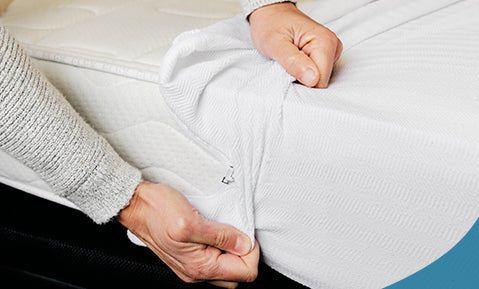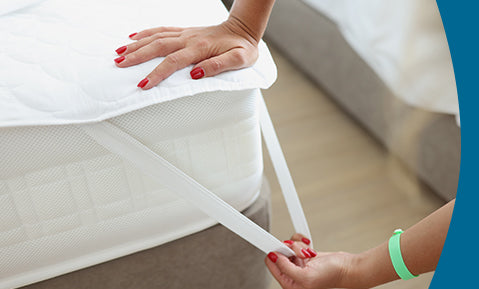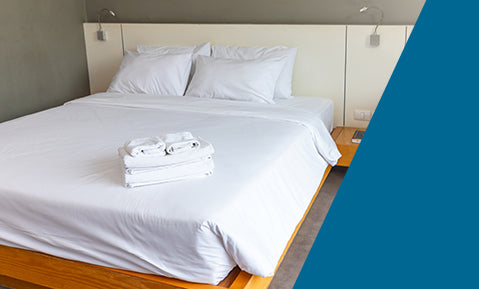
Sleep needs for both infants and kids vary according to their age. And the quality of sleep they get also varies depending on age. As a baby grows, the total amount of sleep required reduces, but the baby starts sleeping for longer periods at night.
Let’s look at how much sleep infants and kids need.
Infant Sleep Requirement
Table: General amount of sleep required by infants from Stanford Children’s Health
| Age | Total Hours of Sleep |
| Newborn | 16 hours |
| 1 month | 15.5 hours |
| 3 months | 15 hours |
| 6 - 12 months | 14 hours |
| 1.5 years | 13.5 hours |
| 2 years | 13 hours |
Sleep in Babies Explained!
Newborns sleep for 8-9 hours during the day and the same amount at night. However, they wake up several times from their sleep.
Because of interrupted sleep, they need to get more quantity of sleep during both the day and the night.
As the newborn grows older, the quality of sleep improves, with longer sleep cycles and more time in rapid eye movement (REM) sleep.
So the time required to sleep during the day decreases, and the baby starts sleeping for more time during the night.
Signs that the Baby is Ready to Sleep
Here are some signs that your baby is ready to fall asleep:
- Yawning
- Looking blankly at empty space
- Fussing
- Rubbing eyes
If you notice these signs, then you can help your child fall asleep with the following tips:
- Avoiding any stimulating activity
- Rocking the cradle or reading a book out loud
- Playing relaxing music
- If the baby is crying, then comfort it
- Pat and soothe the baby if it wakes up at night
- Create a consistent night routine
Sleep Problems in Infants
At about six months, the baby usually starts to wake up again in the middle of the night. It’s usually because of separation anxiety and overstimulation.
Here’s more:
Separation Anxiety
On sensing the absence of the parent, the baby experiences severe anxiety, which wakes up the baby and makes it cry.
However, it is a normal part of the development process.
An 8 month old baby starts to distinguish between faces, so it experiences strong emotions when it is away from its caregivers.
And it also starts learning about object permanence: things exist even when it can’t see them.
Ability to distinguish faces along with object permanence results in serious separation anxiety. Beginning between 6-14 months from the birth, separation anxiety wakes up the baby regularly during sleep.
Although separation anxiety disappears sometimes, it can return back at around 15 months.
Tips for Separation Anxiety in Babies
Here are a few tips that’ll comfort your baby and help it adapt to separation anxiety:
- Consistent goodbye ritual: we, as humans, are hardwired to follow habits. So you can create a consistent goodbye ritual, such as singing a song to the baby before leaving, to prepare the baby for the separation.
- Try a babysitter: babysitters help babies in adapting to separation anxiety. The baby learns to rely on other adults, and its reliance on the primary caregiver decreases.
- Control your emotions: even when the baby cries, you must not draw out the separation process. Crying is a normal process, and trying to comfort the baby by coming back again and again will only prolong the anxiety of the baby.
- Hug the baby: when you return after a short or long separation, hug the baby to soothe its anxiety. Creating good reunion rituals bolsters the parent-child relationship.
Overstimulation
Apart from this, meeting too many people at once can make the baby anxious. The mind is overstimulated, leading to a lot of stress.
Here are a few symptoms that indicate overstimulation in your baby:
- Immediate crying: when babies are irritated, their face tightens up and becomes red.
- Rapid breathing: anxiety and overstimulation increases the heartbeat and breathing rate of babies.
- Moving around: erratic movements imply that the baby is overstimulated. The fight-flight-freeze response activates and the baby gets confused about its emotions.
Here are some tips on soothing the baby when its overstimulated:
- Caress and walk around: More interactions only exacerbate the problem, so you should soothe the baby and keep it away from other people. Walking around while caressing the baby will prove quite helpful.
- Create a regular routine: create a routine for talking to the baby or inviting new people. As the baby gets used to seeing new faces, it becomes less anxious and more used to collecting information from the environment.
- Go for a walk outside: fresh air rejuvenates not just the minds of adults but also that of babies.
To avoid overstimulation, you should keep electronic devices away from the baby. And ensure that the baby does not meet too many people everyday.
When you notice signs of overstimulation, calm down the baby.

Sleep required by kids
Let’s move past babies and get to kids in preschool or school.
Preschool (3-5 years old)
Preschoolers require 10-13 hours of sleep per day, with a nap in the afternoon. They generally require a nap, as they’re quite active.
Napping is associated with better cognition and more happiness in young kids.
However, your preschooler may stop napping on a regular basis. But it’s important for your child to relax and calm down in the middle of the day, even when he or she can’t fall asleep.
Parents should set a napping routine for their preschoolers. A routine will reduce the likelihood that the preschooler will resist taking a nap.
School-Age (6-13 years old)
School going children between the ages of 6 and 13 require 9-11 hours of sleep. The younger your child, the more sleep he or she will require.
But as children grow older, they tend to require less sleep, but still sleep is very crucial to maintain good health and development. One study estimated that up to 75 percent of school-aged kids don’t get enough sleep.
When these kids get into adolescence, their sleep routine and pattern changes as a result of hormonal changes.
Time to stop napping
At a certain age, kids decide to stop taking a nap. And when their parents force them to, kids get irritated and angry.
So how to know that your child is ready to stop taking naps. To find this out, you must look at the signs of excessive daytime sleepiness in children.
If these signs appear in your child, then he or she isn’t ready to give up on naps yet:
- Signs of sleepiness: if your child becomes less active or yawns throughout the day, then he or she may require a longer nap time.
- Heightened emotions: if your child seems too happy or too sad, sometimes even hyperactive and irritable, then this means that he or she is sleep deprived. Sleep deprivation often affects emotional responses in both kids and adults.
- Taking naps: if your kid still follows the nap routine, then he or she isn’t ready to give up on napping yet.
Stop napping
If your kid doesn’t take regular naps, then it may be time to move on from napping. But this must be a gradual process. You should have your child quit napping cold turkey.
Reduce the nap frequency first. Ensure that your child only takes one nap per day instead of two or three. After this, you can work on reducing the amount of time for the one nap that your kid takes daily.
Eliminating naps cold turkey may make the child grumpy and irritable. It may also interfere with his or her cognitive abilities and impede his or her development.
Also, if your child sleeps less during the day, then her or she may require more sleep during the night. Refer to the table at the start of this post and ensure that your child gets enough sleep.
When to see a doctor?

An estimated 25 percent of children suffer from sleep related problems, such as excessive daytime sleepiness. If your child is too young yet resists naps or too old yet naps too much, then consulting a pediatrician may be helpful.
Too much or too little sleeping may signify underlying health issues, which must be dealt with swiftly.
A few reasons for alteration in sleep time include:
- Change in diet
- Sleep disorders
- Inactivity
- Medical condition
Your doctor may be able to diagnose the underlying issue and prescribe a course of treatment accordingly.
Tips to get your child to sleep
Here are a few tips that you can employ to get your child to sleep on a regular time everyday.
Set a sleep schedule
A consistent sleep routine helps the child in falling asleep at the same time everyday. If your child doesn’t have a regular routine, then he or she may refuse to go to sleep at a specific time.
Create a bedtime routine
Like you, your children should have a proper bedtime routine that helps them in creating good habits. A good bedtime routine for children includes the following habits:
- Brushing teeth
- Bedtime story
- Bath
Avoid electronics
People, in general, should avoid electronics close to bedtime, as blue light emitted by these devices hinders the production of melatonin, the sleep hormone.
Melatonin relaxes our body and induces sleep, so a lack of it can cause insomnia-like symptoms.
Generally, you must get your kids away from electronics at least one hour before they go to bed.
Create an ideal sleep environment
An ideal sleep environment is:
- Noiseless: if you can’t get rid of the noise, then purchase a pair of earplugs for your child, or invest in a good white noise machine, which drowns out the noise in the environment.
- Cool: cooler external temperature induces sleep better than a hotter environment.
- Dark: the room should be dark. If your child is afraid of the dark, then you can dim the lights as much as possible.
- Comfortable clothing: get breathable clothing for your child. Cotton fabric is both ideal and affordable, and a great choice for night wear.
- Right pillow and mattress: pillows and mattresses should provide good support but not be too rigid. So find the perfect pillow and mattress for your child according to his or her sleeping preference and body type.
Melatonin for kids
Melatonin, a natural hormone, comes as a sleep supplement. With increased levels of melatonin in our body, we feel more relaxed and drift off into sleep more easily.
Apart from inducing sleep, melatonin regulates:
- Blood pressure
- Immune function and inflammation
- Body temperature
Though side effects of melatonin in kids are rare, they may include:
- Nausea
- Dizziness
- Stomach pains
- Sweating
Other symptoms may appear.
Although many parents give melatonin supplements to their kids, until long studies are done, it is impossible to ascertain if melatonin supplements are completely safe for kids.
Note: consult a pediatrician before giving your child melatonin supplements.
Conclusion
Sleep is important for both adults and kids. As your child grows older, he or she will require less sleep and take fewer naps. But it’s important, as parents, to be on the lookout for any changes in the sleep pattern of your baby or kid.
FAQs
Is it normal for my kid to stop napping?
Yes, kids usually stop napping once they reach a certain age. Some kids stop napping before others. But if you notice that your child is consistently drowsy during the day, then he or she may require a nap or two.
Does feeding impact how the baby sleeps?
Feeding has little impact on the sleep of a baby. There’s a lot of conflicting scientific evidence and the research is inconclusive. So feeding your baby enough shouldn’t be a problem when it comes to sleep.
Should I take my child to the doctor if he doesn’t sleep regularly?
If your child experiences excessive daytime sleepiness and complains about an inability to fall asleep at night, then you should consult a doctor, as drowsiness can imply an underlying medical condition.












